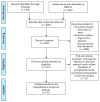The Impact of Microbiota on the Pathogenesis of Amyotrophic Lateral Sclerosis and the Possible Benefits of Polyphenols. An Overview
- PMID: 33672485
- PMCID: PMC7923408
- DOI: 10.3390/metabo11020120
The Impact of Microbiota on the Pathogenesis of Amyotrophic Lateral Sclerosis and the Possible Benefits of Polyphenols. An Overview
Abstract
The relationship between gut microbiota and neurodegenerative diseases is becoming clearer. Among said diseases amyotrophic lateral sclerosis (ALS) stands out due to its severity and, as with other chronic pathologies that cause neurodegeneration, gut microbiota could play a fundamental role in its pathogenesis. Therefore, polyphenols could be a therapeutic alternative due to their anti-inflammatory action and probiotic effect. Thus, the objective of our narrative review was to identify those bacteria that could have connection with the mentioned disease (ALS) and to analyze the benefits produced by administering polyphenols. Therefore, an extensive search was carried out selecting the most relevant articles published between 2005 and 2020 on the PubMed and EBSCO database on research carried out on cell, animal and human models of the disease. Thereby, after selecting, analyzing and debating the main articles on this topic, the bacteria related to the pathogenesis of ALS have been identified, among which we can positively highlight the presence mainly of Akkermansia muciniphila, but also Lactobacillus spp., Bifidobacterium spp. or Butyrivibrio fibrisolvens. Nevertheless, the presence of Escherichia coli or Ruminococcus torques stand out negatively for the disease. In addition, most of these bacteria are associated with molecular changes also linked to the pathogenesis of ALS. However, once the main polyphenols related to improvements in any of these three ALS models were assessed, many of them show positive results that could improve the prognosis of the disease. Nonetheless, epigallocatechin gallate (EGCG), curcumin and resveratrol are the polyphenols considered to show the most promising results as a therapeutic alternative for ALS through changes in microbiota.
Keywords: amyotrophic lateral sclerosis; microbiota; polyphenols.
Conflict of interest statement
Authors declare that the research was conducted in the absence of any commercial or financial relationships that could be construed as a potential conflict of interest.
Figures


References
Publication types
Grants and funding
LinkOut - more resources
Full Text Sources
Other Literature Sources
Miscellaneous

